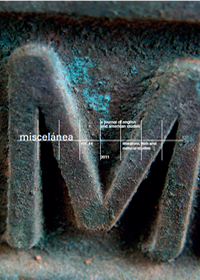Once Were Warriors, but how about Maoritanga Now? Novel and Film as a Dialogic Third Space
DOI:
https://doi.org/10.26754/ojs_misc/mj.20119091Palabras clave:
Postcolonialismo, Alienación, Identidad maorí, Dialogismo, Third spaceResumen
La exitosa novela Once Were Warriors (Alan Duff 1990) provocó una gran polémica por su duro retrato de la alienación indígena de los ghettos de las ciudades neozelandesas. De ascendencia maorí y europea, Alan Duff parte de su experiencia vital en los ghettos para escribir su texto, en el que el autor también responsabilizó a los propios maorí por su existencia problemática en la ciudad y por no hallar soluciones, cosechando la desaprobación de los lectores tanto maorí como no maorí. Bajo la dirección de Lee Tamahori, también mestizo, la novela se adaptó para la gran pantalla en 1995 y el filme homónimo alcanzó fama mundial. Sin embargo, puesto que el guión original de Duff no se llegó a utilizar, no ha de sorprender que la novela y la película cuenten historias diferentes. Ambas retratan a una familia maorí disfuncional en un ambiente urbano opresivo, pero su contenido y estrategia discursiva divergen. Mirando la postcolonialidad maorí bajo una perspectiva bakhtiniana, este ensayo investiga hasta qué punto el diálogo discursivo entre ambas narrativas obedece a los requerimientos del medio narrativo escogido y tiene como resultado agendas y sitios de contestación divergentes.Descargas
Referencias
Bakhtin, Mikhael. 1984. Problems of Dostoevski’s Poetics. Minneapolis: University of Minneapolis Press.
—. (1981) 1994. The Dialogic Imagination: Four Essays by M.M. Bakhtin. Austin: University of Texas Press.
Charles Royal, Te Ahukaramu¯ . 2009. “Ma¯ori”. In: New Zealand Ministry for Culture and Heritage. Te Ara - the Encyclopedia of New Zealand 1999-2010. <http://www.TeAra.govt.nz/en/maori>. Accessed 6 June, 2010.
Duff, Alan. 1990. Once Were Warriors. Auckland: Tandem Press.
—. 1993. Maori: The Crisis and the Challenge. Auckland: Harper Collins.
—. 1996. What becomes of the Broken Hearted? Auckland: Vintage.
Giddings, Robert, Keith Selby and Chris Wensley. 1990. Screening the Novel: The Theory and Practice of Literary Dramatization. London: MacMillan.
Gillard, Garry. 2005. “It’s the Way Things Are: Once Were Warriors”. Screen Education 39: 119-124. <http://search.informit.com.au.ezproxy.scu.edu.au/documentSummary;dn=086121000368566;res=IELHSS>. Accessed 12 April, 2009.
Harding, Bruce. 1992. “Wrestling with Caliban: Patterns of Bi-Racial Encounter in Colour Scheme and Once Were Warriors”. Australian and New Zealand Studies in Canada 8 (Dec): 136-155.
Hereniko, Vilsoni. 1999. “An Interview with Alan Duff”. In Hereniko, Vilsoni (ed.) and Rob Wilson (ed. and introd.) Inside Out: Literature, Cultural Politics, and Identity in the New Pacific. Lanham, MD: Rowman & Littlefield: 119-133.
Holquist, Michael. 1990. Dialogism: Bakhtin and His World. London: Routledge.
“An Interview with Warriors Director Lee Tamahori”. 1995. Fine Line Features online. <http://www.finelinefeatures.com/warriors/waintv.htm>. Accessed 24 June, 2004.
Joyce, Helen. 2007. “Once Were Warriors. By Lee Tamahori”. In Mayer, Geoff and Keith Beattie. The Cinema of Australia and New Zealand. London: Wallflower Press: 157-164.
Mayer, Geoff. 1995. “Going home: Once Were Warriors”. Metro 101: 3-6. <http://search.informit.com.au.ezproxy.scu.edu.au/fullText;dn=81114269466;res=APAFT>. Accessed 19 June, 2010.
Mcdonnell, Brian. 1995. “Once Were Warriors: Controversial Novel Becomes Blockbuster Film”. Metro 101: 7-9. <http://search.informit.com.au.ezproxy.scu.edu.au/fullText;dn=81114269467;res=APAFT>. Accessed 19 June, 2009.
Oder, Norman. 1996. “Alan Duff and Once Were Warriors: ventilating race in New Zealand”. Antipodes 10: 2 (Dec): 137-139.
<http://search.informit.com.au.ezproxy.scu.edu.au/fullText;dn=970707457;res=APAFT>. Accessed 12 April, 2009.
Riedlinger, Peter. 1994. “A false tale well told”. Green Left Weekly 179 (Wed 15 Mar 1994).<http://www.greenleft.org.au/node/7493>. Accessed 22 January, 2010.
Rutherford, Jonathan. “The Third Space. Interview with Homi Bhabha”. In Rutherford, Jonathan (ed.) Identity: Community, Culture, Difference. London: Lawrence and Wishart, 1990: 207-221.
“Signing the Treaty”. 2007. In: New Zealand Ministry for Culture and Heritage. New Zealand history online 2005-2010. <http://www.nzhistory.net.nz/politics/treaty/makingthe-treaty/signing-the-treaty>. Accessed 6 June, 2010.
Simmons, Laurence. 1998. “Ideology and class in Once Were Warriors”. Southern Review 31 (3): 330-342. <http://search.informit.com.au.ezproxy.scu.edu.au/fullText;dn=991010143;res=APAFT>. Accessed 12 April, 2009.
Sklar, Robert. 1995. “Social Realism with Style: An Interview with Lee Tamahori”. Cineaste: America’s Leading Magazine on the Art and Politics of the Cinema 21 (3): 25-27.
De Souza, Pascale. 2007. “Maoritangta in Whale Rider and Once Were Warriors: A Problematic Rebirth through Female Leaders”. Studies in Australasian Cinema 1 (1): 15-27.
Tamahori, Lee. 1994. Once Were Warriors. Distributed by Fine Line Features.
Taonui, Ra ¯wiri. 2009. “Tribal organisation – The history of Ma ¯ori social organisation”. In: New Zealand Ministry for Culture and Heritage. Te Ara - the Encyclopedia of New Zealand 1999-2010. <http://www.TeAra.govt.nz/en/tribal-organisation/6>. Accessed 6 June, 2010.
Thomas, Nicholas. 1993. “Gender and the Politics of Tradition: Alan Duff’s Once Were Warriors”. Kunapipi 15 (2): 57-67.
Thompson, Christina. 1995. “Alan Duff: The Book, the Film, the Interview: The Controversial Author of Once Were Warriors (UPQ) Talks to the Editor of Meanjin”. Meanjin 54 (1): 6-13.
—. 1999. “In Whose Face? An Essay on the Work of Alan Duff”. In Hereniko, Vilsoni and Rob Wilson (eds.) Inside Out: Literature, Cultural Politics, and Identity in the New Pacific. Lanham, MD: Rowman & Littlefield: 105-118.
Thompson, Kirsten Moana. 2003. “Once Were Warriors: New Zealand’s First Indigenous Blockbuster”. In Stringer, Julian (ed. and introd.) Movie Blockbusters. London: Routledge: 230-241.
Waldren, Murray. 1996. “The Duff Guy. An Interview with the author of Once Were Warriors”. The Australian Magazine. <http://members.optusnet.com.au/~waldrenm/duff.html>. Accessed 24 July, 2004.
Descargas
Publicado
Número
Sección
Licencia

Esta obra está bajo una licencia internacional Creative Commons Atribución-NoComercial 4.0.


